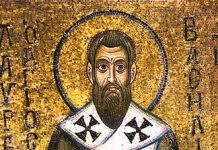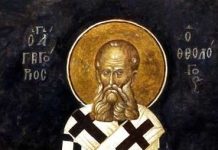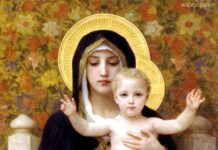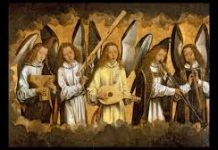Franciscan Capuchins celebrate the feast of our Capuchin brother St Bernard of Corleone on the twelfth of January, and we may delve a little into who was this Franciscan saint.
His full name in the world before joining our Order was Philip Latini. He was born in Sicily, Italy, on 6 February 1605. Philip came from humble social status, is father was a shoemaker, having it in mind to pass on his trade to his son. However his father was bitterly disappointed with his son’s violent character. Filippo, true to the Sicilian traditions of the time and town, learnt how to be violent as well as aggressive. Even if he was educated in the Catholic faith and well-taught in it, he ended up being more interested in soldiering. In the words of two witnesses at his beatification process, Filippo’s only fault was that he was quick to draw his sword at the slightest provocation. He was strongly built and willing to challenge anyone to a fight. This worried his parents, especially after Filippo wounded the hand of one particularly arrogant challenger. This incident, which happened in 1624 when Filippo was 19, was witnessed by many and caused an uproar. It cost the hired killer his arm, and Filippo, now nicknamed the finest blade in Sicily, was shaken to the core. He begged forgiveness from the wounded man, who later became his friend. Reflecting afterwards on what he had done, he felt sorry and decided to change his way of life. Adding to this incident, one also needs to highlight that Filippo showed respect and even care for the elderly, and sought to protect the defenceless from injustice. He prayed to Saint Francis and used to visit a shrine on pilgrimage.
As his religious vocation matured, on December 13, 1631, at the age of 27, Filippo was admitted to the Capuchin novitiate at Caltanissetta, and clothed in the habit of a Capuchin friar – the religious most closely associated with the ordinary people – and took the name Bernard. He now let loose his aggression on his own sinfulness. Brother Bernard fasted almost permanently on bread and water, slept for only three hours a night on a board with a block of wood for a pillow, and scourged himself to blood seven times a day. If he was given any pleasant tasting food he would taste a little without swallowing it and leave the rest aside. He would not wear a new habit or have any new furnishing in his room. By the passage of time he became gentle and kind.
Brother Bernard lived a simple life, moving from one friary to another in the province: Bisacquino, Bivona, Castelvetrano, Burgio, Partinico, Agrigento, Chiusa, Caltabellotta, Polizzi and perhaps also Salemi and Monreale. Having said that it is extremely difficult to detail precise dates. Nevertheless, we do know that he spent the last fifteen years of his life in Palermo, where he welcomed “Sister Death” on January 12, 1667. His assignment, almost exclusively, was that of cook or assistant cook, but he also cared for the sick and did a multitude of other tasks, being helpful to everyone, sharing the workload of his busy brothers and washing the clothes of the priests. In the end, he looked after all the friars’ laundry. His remarkable spiritual stature is a tapestry of deeds and sayings, spiced with heroic, if not incredible, penances and mortifications.
The testimonies included in the process leading to his canonization detail the special characteristics of his personality. His was the gentle strength of his Sicilian homeland: He always exhorted us to love God and do penance for our sins. He was always engrossed in prayer… for him going to church was a sumptuous feast of prayer and union with God. Time, on those occasions, would disappear and he was often rapt in ecstasy. He liked to stay in church at night because – as he himself explained – ‘it wasn’t good to leave the Blessed Sacrament alone and he would keep him company until the other friars arrived.
He found time to help the sacristan so that he could be as close as possible to the tabernacle. Contrary to the custom of the time, he would receive communion daily. In the final years of his life his superiors, seeing him overwhelmed by constant penances, freed him from all other jobs except the service of the altar. His solidarity with his fellow men took on a social dimension. In Palermo, at times of natural disaster such as earthquakes and hurricanes, he would mediate in front of the tabernacle, struggling with God, like Moses: Easy Lord, be gentle with us! I want this grace, Lord, I want it! And the disaster ceased, the scourge was lifted. On his deathbed, after receiving the final blessing, he joyfully kept repeating: Let’s go, let’s go, and breathed his last. It was 2 p.m. on Wednesday, January 12, 1667. One fellow friar, Brother Antonino of Partanna, who had been particularly close to him, saw him in the spirit, radiant and repeating with joy beyond words: Paradise! Paradise! Paradise! O, blessed are the disciplines, blissful the night-watches! Blessed the penances, the self-will sacrificed! O, the blessing of fasting, and acts of obedience! How great is the blessing of religious life well lived!
God rewarded him with great graces in prayer, including the gift of knowing the date of his death four months in advance, and the grace of miracles. He died in Palermo, Sicily, on 12 January 1667, and was beatified by Pope Clement XIII on 15 May 1768. Pope John Paul II canonized him on 10 June 2001.
This great Capuchin saint reminds us of a sermon by Saint Bonaventure entitled Let us do penance and suffer with Christ. Here is the sermon’s text:
The cross, although in itself it is something horrible ‐ and especially was it so before the Passion of Christ ‐ is yet something to be ardently desired, because it is the source of life. All seek and long for eternal life; no one is found so base as not to say that he desires and seeks it. But the wicked do not seek it in the right way, because they want to have it as well as their crimes and sins.
Beloved, this is not the way to eternal life; that goes by the bridge which Christ built: by the cross, by fighting against and overcoming our enemies. Externally the cross seems horrible, but internally it is desirable. If we consider only its outward appearance, we see an instrument of death; but to one who considers its deeper meaning it is seen as the tree of life, because of him who hung upon it. Since it is the source of life, it gives life by infusing grace. As the Epistle to the Romans says: “The wages of sin is death; but the free gift of God is eternal life.” It is the wood whence comes the life‐giving grace by which we are renewed for Christ by the waters of penance.
What is the wood which has the power to transform man’s aridity into fertility, to bring him from death to life? It is the wood of the cross of Christ. Why did the Son of God suffer for men, and not for the angels? Because man is capable of repentance, and the angels are not. Man is a plant which blooms under the influence of the waters of repentance.
Therefore, because the cross is the wood whence comes life‐giving grace, let us who die so often by our sins desire this wood, do penance and suffer with Christ. “Since therefore Christ suffered in the flesh, arm yourselves with the same thought,” says Saint Peter. Unless we do penance, I do not see how we will be able to answer for ourselves on the day of judgment.
If therefore you wish to bear fruit spiritually, you must die according to the flesh. In John we are given the example of Christ: “Unless a grain of wheat falls into the earth and dies, it remains alone; but if it dies, it bears much fruit.” If therefore we wish to have the fruit of the tree of life with Christ, who was crucified and died, we must be crucified with him, so that we may be able to bear spiritual fruit.
Beloved, he who would find the Lord, finds him in the cross; and therefore he who abandons the cross, abandons also the Lord. He Who burns with the desire for the cross and for the Lord, finds both together; and he does not find a vacuum, but a source of abundant grace.
O God, you have given us Saint Bernard as an admirable example of penance and gospel living. Through his intercession, may we grow in the spirit of conversion and so come to love you above all else and obey your will in all things. We ask this through our Lord Jesus Christ your Son, who lives and reigns with you and the Holy Spirit, God, for ever and ever. Amen.










